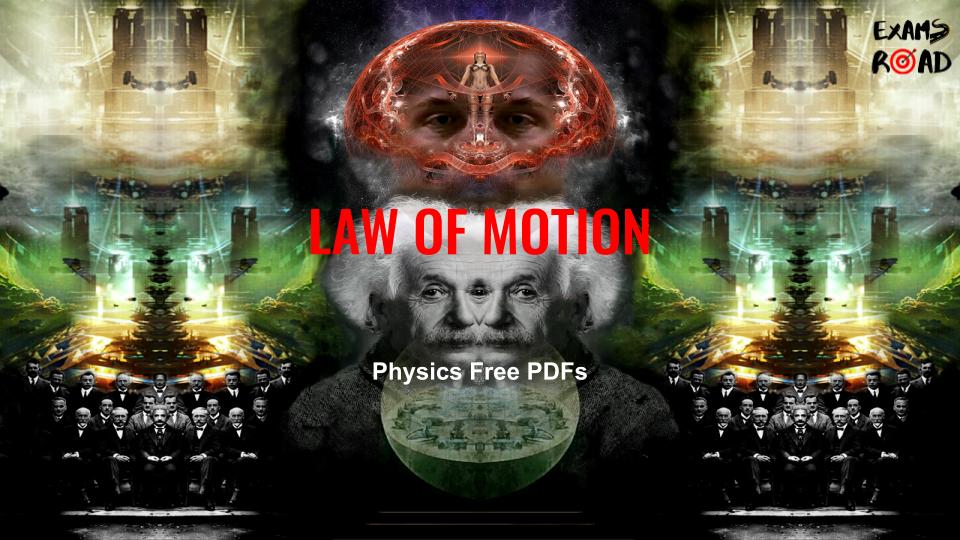Physics Quiz on First Law of Motion
Physics Quiz on First Law of Motion: Previous trends reveal that NEET aspirants find Physics as the most challenging section amongst the other sections. But most of them fail to decipher the reason behind this. This particularly can be as the candidates taking up this examination are predominantly medical aspirants with their subject of interest being Biology. Also, sections like Physics are more on theories, laws, numerical as opposed to Biology which is more of fact-based, life sciences and comprising of substantial explanations. In this post we are providing you Physics quiz on First Law of Motion.
Physics Quiz on First Law of Motion
1. In the above question what will happen if the string C is stretched slowly?
- The portion BC of the string breaks
- The portion AB of the string breaks
- None of the strings breaks
- None of the above options
(2) The portion AB of the string breaks
2. What will happen if a force is applied to a body moving with a constant speed along a straight line?
- The speed increases
- The direction changes
- The momentum decreases
- Continues to move with uniform velocity
(4) Continues to move with uniform velocity
3. Why does a rider on horseback fall when the horse starts running all of a sudden?
- The rider is suddenly afraid of falling
- The lower body of the rider moves forward with the horse but the inertia of rest keep the upper body at rest
- The rider is pushed backwards
- None of the above options
(2) The lower body of the rider moves forward with the horse but the inertia of rest keep the upper body at rest
4. Why do passengers in a moving train suddenly feel a jerk in the forward direction when the train stops abruptly?
- The upper body of passengers continues to be in the state of motion while the lower part of the body which in contact with the seat remains at rest
- The back of the seat pushes passengers forward
- The inertia of rest stops the train and takes the passengers forward
- Nothing can be said due to insufficient data
(1) The upper body of passengers continues to be in the state of motion while the lower part of the body which in contact with the seat remains at rest
5. Which of the following does Newton’s first law of motion describe?
- Inertia
- Work
- Energy
- Moment of Inertia
(1) Inertia
6. A bird weighing 2 kg is locked inside a cage of mass 1 kg. If the bird starts flying what will be the weight of the bird and cage assembly?
- 4 kg
- 3 kg
- 2.5 kg
- 1.5 kg
(2) 3 kg
7. Why does a man getting off a moving bus fall down?
- He falls because of his habit of leaning forward
- Due to inertia of motion, the upper body continues to be in motion in the forward direction but the feet comes to rest as soon as they touch the ground
- Due to inertia of rest, the road is left behind and the man reaches forward
- Due to all of the reasons stated above
(2) Due to inertia of motion, the upper body continues to be in motion in the forward direction but the feet comes to rest as soon as they touch the ground
8. A boy in the topmost birth in a compartment of a train drops an apple aiming at the open hands of his birth while the train is just going to stop at the railway station. Where will the apple fall if the brother is sitting vertically below his hands at a distance of 2 meters?
- The apple falls precisely on the hands of his brother
- Slightly away from the hands of his brother in the direction opposite to the direction of the motion of the train
- Slightly away from the hands of his brother in the direction of the motion of the train
- None of the above
(3) Slightly away from the hands of his brother in the direction of the motion of the train
9. Which of the following statements is true about inertia?
- Inertia is the property of a body by virtue of which the body is unable to change by itself the state of rest.
- Inertia is the property of a body by virtue of which the body is able to change by itself the state of rest
- Inertia is the property of a body by virtue of which the body is unable to change by itself the direction of motion
- Inertia is the property of a body by virtue of which the body is unable to change by itself the state of rest and uniform linear motion
(4) Inertia is the property of a body by virtue of which the body is unable to change by itself the state of rest and uniform linear motion
Subject-wise Tricks Tips & Question with Solution PDFs
| S.NO | Subject Name | Topic-wise PDFs Download Link |
| 1. | Chemistry Notes PDF | Click Here to Download Now |
| 2. | Maths Notes PDF | Click Here to Download Now |
| 3. | Physics Notes PDF | Click Here to Download Now |
| 4. | Biology Notes PDF | Click Here to Download Now |
Syllabus and Previous Year Papers |
|
| Chemistry Syllabus for NEET & AIIMS Exams | Click Here |
| Chemistry Syllabus for JEE Mains & Advanced | Click Here |
| Chapter Wise NEET Chemistry Syllabus | Click Here |
| Physics Syllabus for NEET & AIIMS Exams | Click Here |
| Physics Syllabus for JEE Mains & Advanced | Click Here |
| Chapter Wise NEET Physics Syllabus | Click Here |
| Biology Syllabus for NEET & AIIMS Exams | Click Here |
| Chapter Wise NEET Biology Syllabus | Click Here |
| Maths Syllabus for JEE Mains & Advanced | Click Here |
| Download NEET Previous Year Question Papers with Solution | Click Here |
|
|
|
| https://www.facebook.com/ExamsRoadOfficial | |
| Telegram | https://telegram.me/ExamsRoad |
| https://twitter.com/ExamsRoad | |
| https://www.instagram.com/ExamsRoad/ | |
| YouTube | Click Here To Subscribe Now |
Thank You.
By TEAM ExamsRoad.com

















